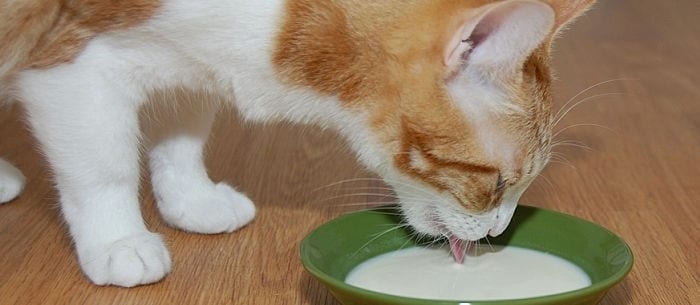Is milk bad for cats? You see cats lapping up milk from saucers in movies and cartoons. It’s become a symbol of hungry kittens and cats everywhere, but is it something your cat should actually be drinking? And could it be harmful to your feline friend? It’s hard to know what human foods are allowed for pets. Find out whether it’s OK to feed your cat cow’s milk.
Should Cats Drink Milk?
According to the American Animal Hospital Association (AAHA), kittens get everything they need nutritionally during their first weeks from their mother’s milk. As your kitten becomes an adult, standard cat food based upon your veterinarian’s recommendation provides the nutrition your feline friend needs to be happy and healthy.
As your cat grows, you may notice her craving some dairy. You should still ask yourself though, is milk bad for cats? The cow’s milk you and your family drink should never be given to kittens or cats, as it can cause diarrhea. If the mother cat’s milk isn’t available, you can get a commercial milk replacement. Your next option shouldn’t be the milk in your cereal bowl.
Are Cats Lactose Intolerant?
The American Society for the Prevention of Cruelty to Animals (ASPCA) agrees that milk should not be fed to cats either as a treat or as a substitute for water because cats don’t possess significant amounts of lactase in their bodies. Lactase is the enzyme that breaks down lactose in milk when ingested, and if lactase isn’t present in large enough amounts, the lactose causes illness. Yes, just like humans, cats can also be lactose intolerant. The primary symptoms of this are diarrhea, gas, or vomiting, says the ASPCA.
Besides digestive issues, your cat could suffer from itching and skin rashes because of a bad reaction to milk, according to the ASPCA. It’s not just straight milk you have to worry about, either. Be aware that milk-based products such as cheese or ice cream can lead to the same digestive issues, so stick only with designated cat foods or treats. Also, remember, water should be the only liquid your adult cat ingests. Make sure it’s fresh and constantly available to him. Hiring a pet sitter to stop in while you’re at work can help with keeping your cat company and the water dish fresh.
Does Milk Make Your Cat Fat?
Just like humans, animals become overweight by consuming more calories than they require. In general, the typical house cat doesn’t get the exercise he or she needs, so adding the calories of milk in addition to a regular feeding program can cause your cat to become overweight. You’ll end up dealing with a fat cat as well as a sick one.
Depending upon the breed, the average domesticated house cat should ideally weigh between eight to 10 pounds, according to the Association for Pet Obesity Prevention. For a 10-pound cat, the average caloric daily intake should be around 200 calories, says the All Feline Hospital. One eight-ounce cup of nonfat milk has 91 calories, according to CalorieKing, and one cup of whole milk has 146 calories. For the average cat, too many added treats, especially those like milk, could tip him into the overweight category.
Do Cats Even Like Milk?
Many cats actually like milk, according to The Cat Fanciers’ Association (CFA). If offered, cats often like to drink milk because it’s fresh and cold, and some may enjoy the taste. Despite this, it’s strongly recommended cats avoid ingesting milk. As always, check with your vet if you have any questions related to your cat’s diet.
Want to know what your cat can actually eat? Check out What Do Cats Eat? The Answer May Surprise You.
Laura Richards is a Boston-based freelance writer and the mother of four boys including a set of identical twins and is also mom to three rescue pets: Scarlett, a 7-year-old beagle, and Edith and Ollie, 15-year-old identical twin black cats. She has written for numerous parenting publications and is the president of On Point Communications.
* This article is for general informational purposes only. It is not intended nor implied to be providing medical advice and is not a substitute for such advice. The reader should always consult a health care provider concerning any medical condition or treatment plan. Neither Care.com nor the author assumes any responsibility or liability with respect to use of any information contained herein.



